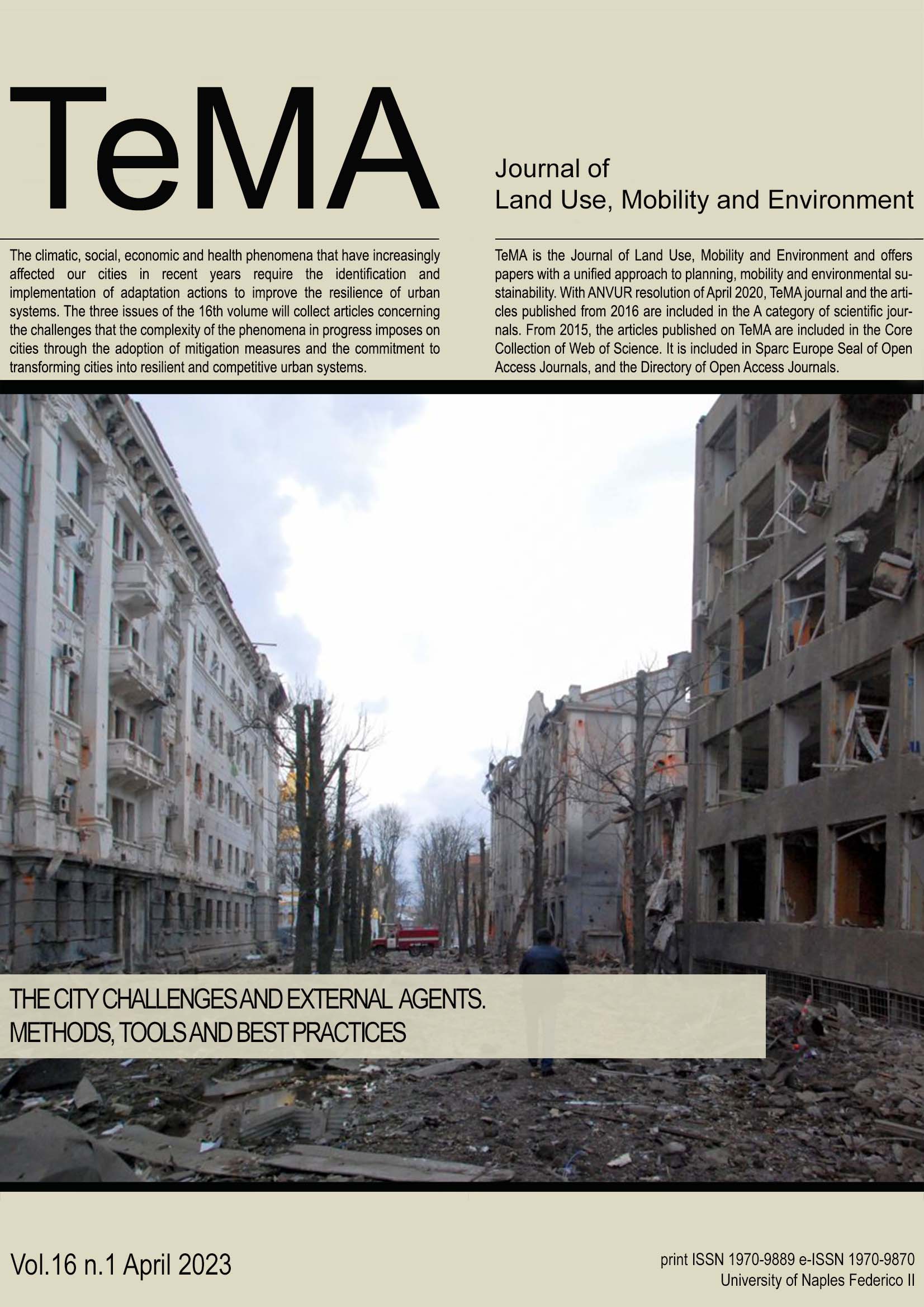Circular economy in urban areas: evidence from global cities
Abstract
Starting from the relationship between urban planning and mobility management, TeMA has gradually expanded the view of the covered topics, always following a rigorous scientific in-depth analysis. This section of the Journal, Review Notes, is the expression of a continuous updating of emerging topics concerning relationships among urban planning, mobility and environment, through a collection of short scientific papers. The Review Notes are made of four parts. Each section examines a specific aspect of the broader information storage within the main interests of TeMA Journal. In particular, the Economy, business and land use section aims at presenting recent advancements on relevant topics that underlie socio-economic relationships between firms and territories. The present note aims at addressing the issue of circular economy in urban contexts describing theoretical approaches and identifying best practices from cities across the world.
Downloads
References
Bassi, A. M., Bianchi, M., Guzzetti, M., Pallaske, G., & Tapia, C. (2021). Improving the understanding of circular economy potential at territorial level using systems thinking. Sustainable Production and Consumption, 27, 128–140. https://doi.org/10.1016/j.spc.2020.10.028
Carpentieri G., Guida C., Fevola O., & Sgambati S. (2020). The Covid-19 pandemic from the elderly perspective in urban areas: An evaluation of urban green areas in 10 European capitals. TeMA - Journal of Land Use, Mobility and Environment, 13(3), 389-408. https://doi.org/10.6092/1970-9870/7007
Carpentieri G., Guida C., & Sgambati S. (2023). Textometric analysis on the ongoing academic spatial planning debate. TeMA - Journal of Land Use, Mobility and Environment, (1), 197-223. https://doi.org/10.6093/1970-9870/9782
Guida, C., Carpentieri, G., & Masoumi, H. (2022). Measuring spatial accessibility to urban services for older adults: an application to healthcare facilities in Milan. European transport research review, 14(1), 23. https://doi.org/10.1186/s12544-022-00544-3
Guida, C., Carpentieri, G., & Zacharias, J. (2022). A Smart Approach for Integrated Land-Use and Transport Planning—An Application to the Naples Metro Station Areas. In Computational Science and Its Applications–ICCSA 2022 Workshops: Malaga, Spain, July 4–7, 2022, Proceedings, Part VI (pp. 395-409). Cham: Springer International Publishing. https://doi.org/10.1007/978-3-031-10592-0_29
Christensen, T. B. (2021). Towards a circular economy in cities: Exploring local modes of governance in the transition towards a circular economy in construction and textile recycling. Journal of Cleaner Production, 305, 127058. https://doi.org/10.1016/j.jclepro.2021.127058
Corvellec, H., Stowell, A. F., & Johansson, N. (2022). Critiques of the circular economy. Journal of Industrial Ecology, 26(2), 421–432. https://doi.org/10.1111/jiec.13187
Ekman, P., Rondell, J., & Yang, Y. (2019). Exploring smart cities and market transformations from a service-dominant logic perspective. Sustainable Cities and Society, 51. https://doi.org/10.1016/j.scs.2019.101731
Folke, C., Hahn, T., Olsson, P., & Norberg, J. (2005). Adaptive governance of social-ecological systems. Annual Review of Environment and Resources, 30, 441–473. https://doi.org/10.1146/annurev.energy.30.050504.144511
Guida, C., & Caglioni, M. (2020). Urban accessibility: the paradox, the paradigms and the measures. A scientific review. TeMA Journal of Land Use Mobility and Environment, 13(2), 149–168. https://doi.org/10.6092/1970-9870/6743
Kennedy, C., Pincetl, S., & Bunje, P. (2011). The study of urban metabolism and its applications to urban planning and design. Environmental Pollution, 159(8–9), 1965–1973.
Petit-Boix, A., & Leipold, S. (2018). Circular economy in cities: Reviewing how environmental research aligns with local practices. Journal of Cleaner Production, 195, 1270–1281. https://doi.org/10.1016/j.jclepro.2018.05.281
Pilogallo, A., Saganeiti, L., Scorza, F., & Murgante, B. (2019). Ecosystem services-based impact assessment for low carbon transition processes. TeMA Journal of Land Use, Mobility and Environment, 12(2), 127–138. https://doi.org/10.6092/1970-9870/6117
Pirlone, F., & Spadaro, I. (2020). The resilient city and adapting to the health emergency. TeMA Journal of Land Use Mobility and Environment, (TeMA Special Issue), 305–314. https://doi.org/10.6092/1970-9870/6856
Tira, M. (2020). About the Sustainability of Urban Settlements. TeMA Journal of Land Use, Mobility and Environment, 361–371. https://doi.org/10.6092/1970-9870/6984
Wang, N., Lee, J. C. K., Zhang, J., Chen, H., & Li, H. (2018). Evaluation of Urban circular economy development: An empirical research of 40 cities in China. Journal of Cleaner Production, 180, 876–887. https://doi.org/10.1016/j.jclepro.2018.01.089
Williams, J. (2019). Circular cities. Urban Studies, 56(13), 2746–2762. https://doi.org/10.1177/0042098018806133
Copyright (c) 2023 TeMA - Journal of Land Use, Mobility and Environment

This work is licensed under a Creative Commons Attribution 4.0 International License.
Authors who publish in this journal agree to the following:
1. Authors retain the rights to their work and give in to the journal the right of first publication of the work simultaneously licensed under a Creative Commons License - Attribution that allows others to share the work indicating the authorship and the initial publication in this journal.
2. Authors can adhere to other agreements of non-exclusive license for the distribution of the published version of the work (ex. To deposit it in an institutional repository or to publish it in a monography), provided to indicate that the document was first published in this journal.
3. Authors can distribute their work online (ex. In institutional repositories or in their website) prior to and during the submission process, as it can lead to productive exchanges and it can increase the quotations of the published work (See The Effect of Open Access)

